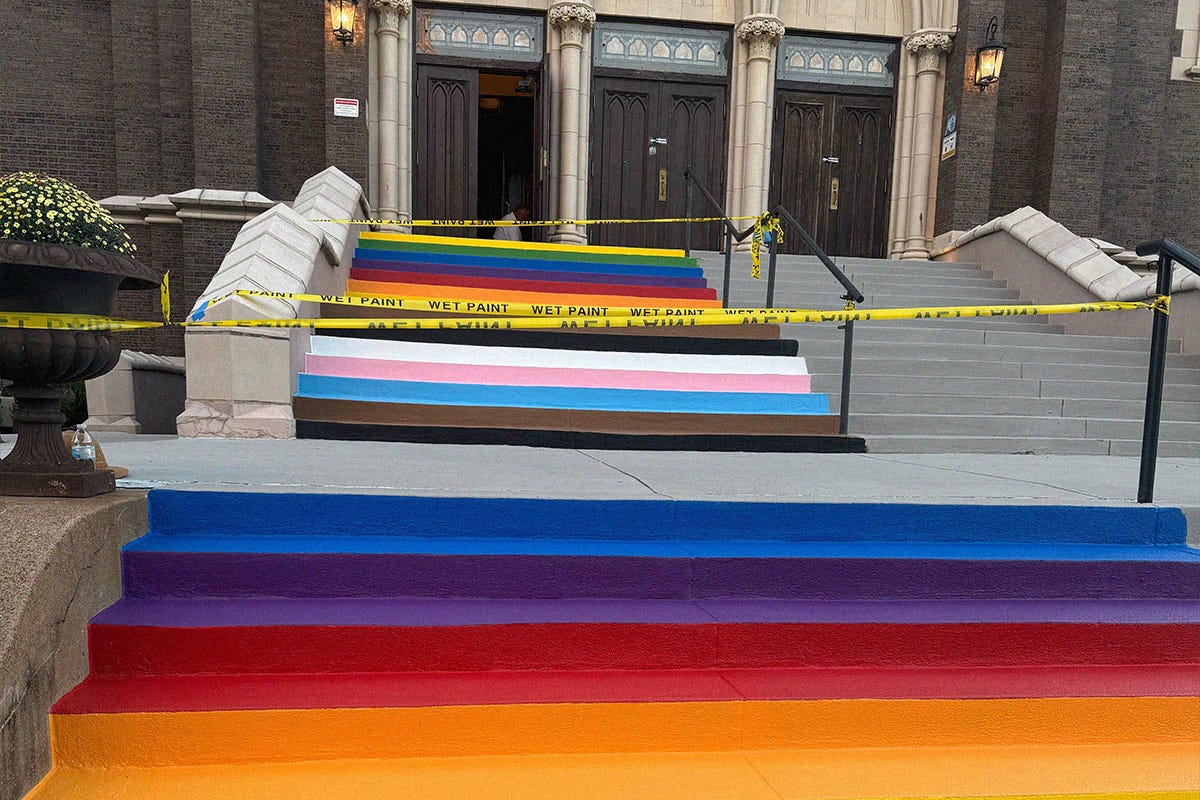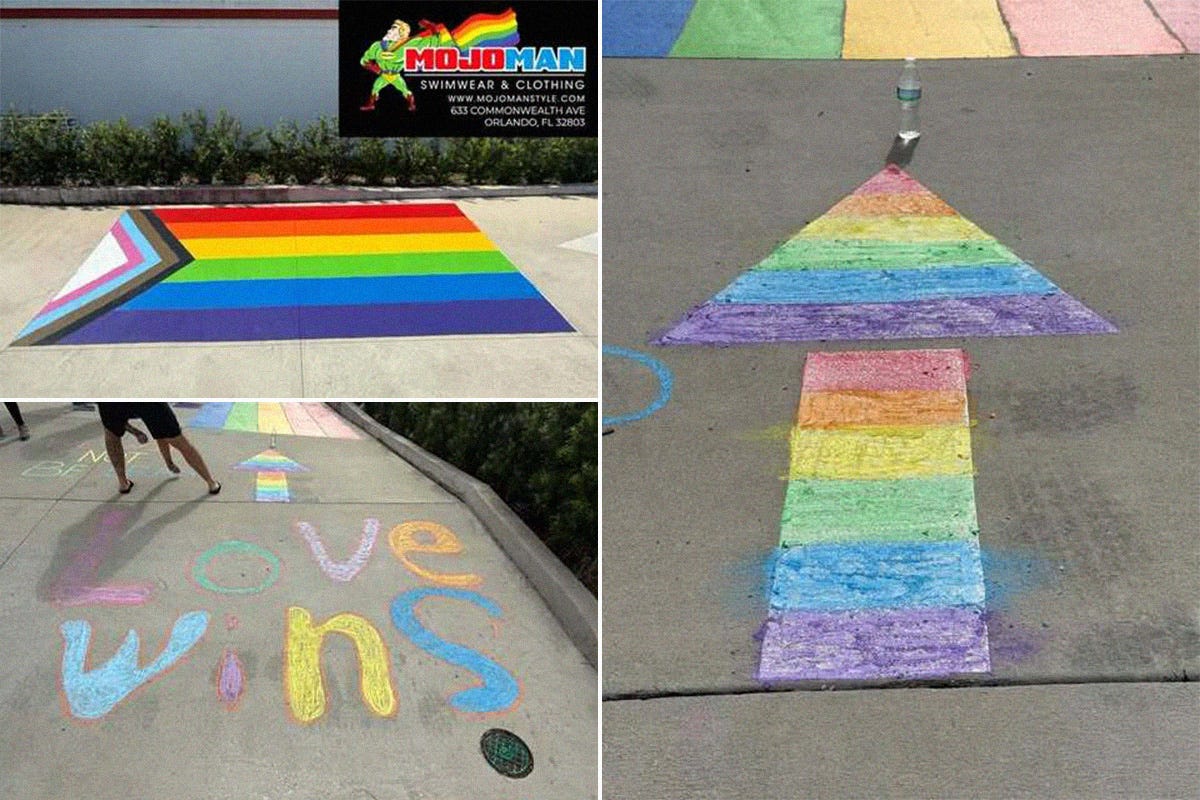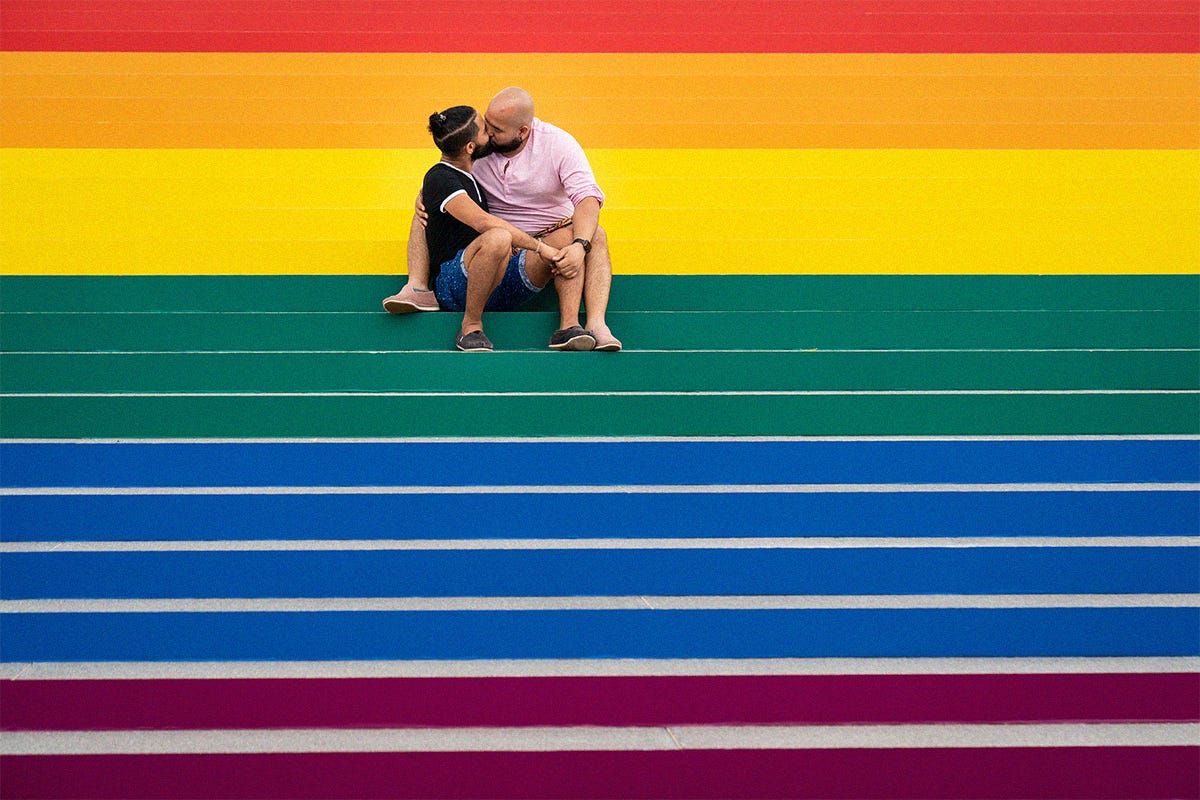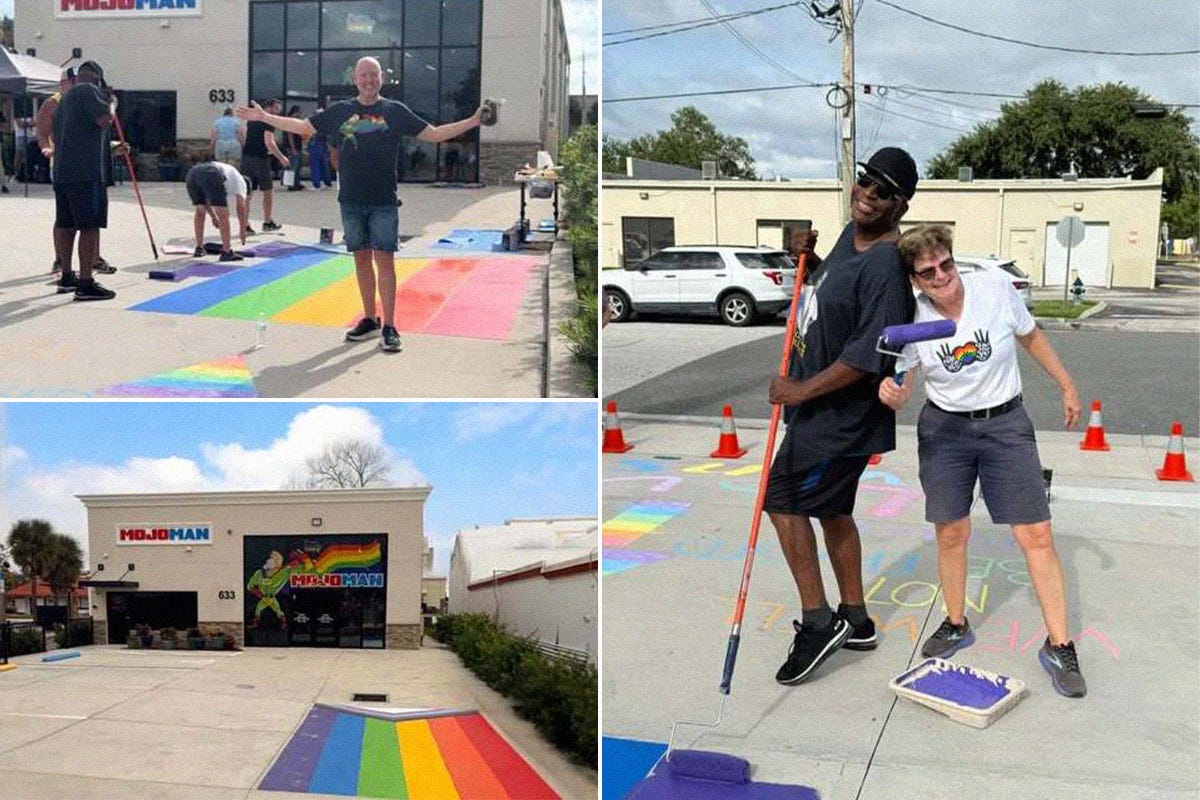The Resistance to Trump’s War on Rainbow Crosswalks Has Begun
Federal orders to remove rainbow crosswalks have sparked a colorful wave of resistance from churches and small businesses.
As the Trump administration orders the removal of rainbow crosswalks from U.S. roads, some small businesses and private entities have begun to fight back.
On October 21, Oak Lawn United Methodist Church in Dallas announced that the congregation was in the process of painting its steps in rainbow colors after Gov. Greg Abbott (R) threatened Texas municipalities if they did not follow federal directives limiting LGBTQ+ public displays. After Transportation Secretary Sean Duffy issued a July directive to sitting U.S. governors ordering them to remove “political messages of any nature, artwork, or anything else that detracts from the core mission of driver and pedestrian safety,” Abbott promised to withhold critical funding if cities and counties across the state do not comply.
While Dallas’ crosswalk has remained intact as city leaders reportedly explore their legal options, the removal of several rainbow walkways from Houston last week signals that further targeting of the LGBTQ+ community could be imminent. Oak Lawn UMC’s front entrance faces out into a busy intersection adorned with a colorful crosswalk, in tribute to the church’s own namesake: the city’s historic gayborhood. Located in central Dallas, Oak Lawn is the state’s first officially recognized LGBTQ+ enclave, home to just over 50,000 residents.
Rev. Ryan Weger, who has lived in Dallas for 15 years, says the possibility that the neighborhood’s iconic crosswalk could soon be erased has been disappointing. He says it was important for the church to let both the community and the public know that they fiercely oppose the federal and state government’s efforts.
“To the wider world, we are saying we resist,” Weger tells Queer Agenda. “Our United Methodist baptismal vows say that we’re committed to opposing evil and injustice in whatever forms they present themselves, and we clearly see evil and injustice happening in the world and as a part of the federal and state government. It’s our job to stand up for justice and those who need it, and that’s what we’re here for.”
As Florida likewise bends to the White House’s will, LGBTQ+ business owners in the state have also signaled their resistance to erasure. Hours after Gov. Ron DeSantis (R) forced the removal of a rainbow crosswalk outside Orlando’s Pulse nightclub, the local gay apparel company MojoMan Swimwear painted a large rainbow flag in front of its business. After the store’s owner, Lane Blackwell, first heard that the Pulse crosswalk had been painted over on August 20, he says that his first thought was, “Somebody needs to do something,” and then, before he knew it, he was at the store buying paint. MojoMan’s new rainbow walkway was unveiled the very next day.
“There were a lot of people that were [at Pulse], that made it out, and that are still traumatized by it,” he tells Queer Agenda. “You can’t let a political administration just wipe you off the map and not do something about it.”
A former patron of Pulse nightclub, Blackwell lost numerous friends during the shooting on June 12, 2016, when a gunman opened fire during the Orlando gay bar’s monthly Latin night. Just over a month after that horrific attack, a rainbow crosswalk was installed outside Pulse as a tribute to the 49 people killed and 53 injured. The display was, at the time, approved by the Florida Department of Transportation (FDOT), the exact same agency that would be tasked with its eradication eight years later. In July, the head of FDOT, Transportation Secretary Jared Perdue, issued a memo claiming that “non-standard surface markings… can lead to distractions or misunderstandings, jeopardizing both driver and pedestrian safety.”
What was most upsetting to Blackwell about Florida’s about-face on rainbow crosswalks, he says, is the way the decision was finalized: overnight, without any prior notice reportedly given to Orlando municipal leaders. Blackwell can’t help but recognize the unfortunate parallels to the tragedy itself.
“Pulse happened at 2:00 am, and then they came in the middle of the night and removed the rainbow crosswalk without telling the city officials or anybody else,” he says. “We painted our rainbow flag in the parking lot in the middle of the day because we were showing that we’re out here in the daylight. We’re not going to hide in the darkness, and we have to do what we can to let everybody know that we’re not going anywhere.”
Other Orlando companies have also stepped up as DeSantis sets his sights on eliminating rainbow crosswalks throughout the state. Displays that have already been removed include colorful walkways in Gainesville, Jacksonville, Key West, Miami Beach, St. Petersburg, and Tallahassee, while Fort Lauderdale has instead chosen to contest the mandate. As justification for the crackdown, the governor has alleged that — in addition to the federal edict — a new law passed in June effectively forces his hand on the issue, even though that law never mentions rainbow crosswalks. (The legislation also did not alter any of Florida’s preexisting guidelines on approved road displays.)
One Orlando business to stand up for the LGBTQ+ community was Se7en Bites, a local comfort food restaurant owned by Chef Trina Gregory. After the Pulse crosswalks were painted over, Gregory converted the eatery’s parking lot into an art installation by allowing artists to paint rainbow murals on 49 different parking spaces. Gregory says that thousands of artists have reached out in hopes of participating, and she has received phone calls and messages from all over the world to thank her.
“A man in Kentucky said that he feels like he hasn’t been seen or felt safe in his city, but knowing that there’s a place where we’ve created this safe space for people [meant a lot],” she tells Queer Agenda. “It reminds me to be grateful for the fact that we all have each other, and we have each other’s backs. One person can make a big impact, even when you don’t think you’re going to.”
Many say it is that very solidarity that is giving them hope as the fight to preserve America’s rainbow crosswalks proceeds. The removal of colorful walkways in Houston and Orlando was met with vociferous protest, including demonstrators chalking new makeshift murals in the streets to replace those that were removed, leading to several arrests. After activists reportedly returned to the site of the former Pulse nightclub with paint, police officers were stationed outside the bar to enforce FDOT’s orders. When the Miami Beach crosswalk was erased on October 5, community members reportedly chanted in protest, “Miami Beach, forever proud.”
For its part, Oak Lawn UMC is doubling down on its newly unveiled rainbow steps by adding an inscription: “Let justice roll down like waters,” referencing a passage from the Book of Amos in the Old Testament. According to Rev. Weger, those words are a powerful illustration of both his church’s values and what he believes God’s wishes to be. Oak Lawn UMC typically sees around 600 each month as part of its LGBTQ+ focused 12-recovery program and does extensive work feeding local unhoused populations, he says, because it is what they are called to do: to care for others.
“We want more people to know that in this world, where Christian nationalism and authoritarianism is becoming the celebrated style of being a Christian, there are churches that are open to those that need them,” he says. “It’s an act of not only resistance, but also of hospitality.”








Another exceptional piece, Nico! Thank you to you and to the great team at Queer Agenda for fighting the good fight. Truly enjoy receiving these newsletters.